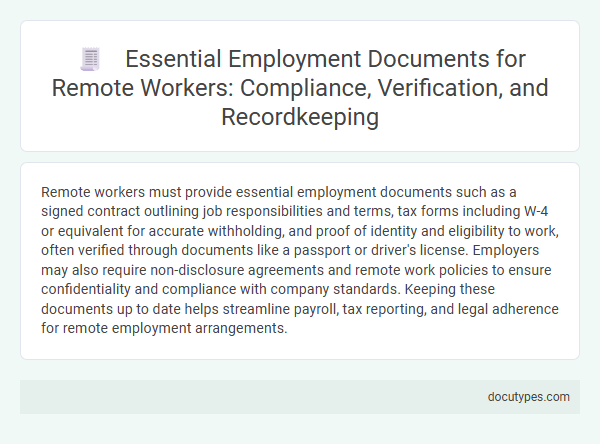Remote workers must provide essential employment documents such as a signed contract outlining job responsibilities and terms, tax forms including W-4 or equivalent for accurate withholding, and proof of identity and eligibility to work, often verified through documents like a passport or driver's license. Employers may also require non-disclosure agreements and remote work policies to ensure confidentiality and compliance with company standards. Keeping these documents up to date helps streamline payroll, tax reporting, and legal adherence for remote employment arrangements.
Introduction to Essential Employment Documents for Remote Workers
Employers must ensure all essential employment documents are collected to manage remote workers effectively. Proper documentation supports compliance, communication, and performance tracking in remote work settings.
- Employment Contract - Details terms, responsibilities, and expectations between employer and remote worker.
- Tax and Payroll Forms - Includes documents like W-4 or equivalent, necessary for accurate tax withholding and payroll processing.
- Confidentiality and Data Security Agreements - Protects company information and ensures remote workers adhere to security protocols.
Key Compliance Requirements for Remote Work Documentation
Employers must collect essential employment documents to comply with labor laws when hiring remote workers. Key documents include signed employment contracts, tax forms, and identity verification records.
You must ensure remote workers complete onboarding forms such as W-4 or equivalent tax withholding forms and I-9 employment eligibility verification in the United States. Maintaining accurate records helps meet legal requirements and supports smooth payroll processing.
Employment Contracts and Remote Work Agreements
Which employment documents are required for remote workers? Employment contracts are essential to outline job responsibilities, compensation, and terms of employment clearly. Remote work agreements specify expectations, work hours, and equipment use to ensure smooth collaboration and compliance.
Onboarding Paperwork: What Remote Workers Need to Submit
Remote workers must submit specific onboarding documents to comply with employment regulations and ensure a smooth integration into the company. Proper documentation helps verify identity, eligibility to work, and agreement to company policies.
- Proof of Identity - Remote employees are required to provide a government-issued ID to confirm their identity and eligibility.
- Employment Eligibility Form - Completion of Form I-9 or equivalent verifies legal authorization to work in the country.
- Signed Employment Contract - This document outlines job responsibilities, compensation, and terms of remote work agreement.
Collecting and verifying these onboarding documents is essential to establish compliance and a clear working relationship with remote employees.
Identity Verification and Right-to-Work Documentation
Employers must obtain valid identity verification and right-to-work documentation from remote workers to comply with legal requirements. These documents confirm the employee's eligibility to work and prevent unauthorized employment.
Common identity verification documents include government-issued photo IDs such as passports or driver's licenses. Right-to-work documentation varies by country but often includes work permits, visas, or social security cards. Employers should verify these documents carefully through secure channels to maintain compliance with labor laws and avoid penalties.
Payroll Forms: Tax Withholding and Direct Deposit Setup
Remote workers must complete essential payroll forms to ensure accurate tax withholding and timely salary payments. The IRS Form W-4 is required to determine the correct federal income tax withholding based on the employee's personal and financial situation.
Direct deposit setup forms are crucial for seamless payment processing, enabling funds to be transferred directly to the employee's bank account. Employers often require a voided check or bank account details to verify and activate direct deposit for remote workers.
Documentation for Health, Safety, and Workplace Policies
Remote workers must have clear documentation outlining health, safety, and workplace policies to ensure compliance with labor regulations. Employers should provide guidelines on ergonomic setups, emergency procedures, and mental health resources tailored for home offices. Maintaining these documents helps protect both employees and companies by establishing standards for remote work environments.
Recordkeeping Requirements for Remote Work Compliance
Remote work compliance demands meticulous recordkeeping to ensure all employment documents are accurate and accessible. Your responsibility includes maintaining these documents securely to meet legal and regulatory standards.
- Employment Contracts - Detailed agreements outlining job roles, expectations, and remote work terms must be preserved for reference and dispute resolution.
- Work Hours and Attendance Records - Accurate tracking of hours worked and attendance is essential to comply with labor laws and payroll requirements.
- Tax and Payroll Documentation - Proper records of tax forms, wage statements, and benefits documentation are critical for auditing and legal compliance.
Digital Signature and Secure Document Storage Solutions
| Employment Document | Requirement for Remote Workers | Key Considerations |
|---|---|---|
| Employment Contract | Mandatory with digital signature | Legally binding when signed electronically; ensures remote verification and compliance |
| Tax Forms | Required and digitally signed | Secure submission protects sensitive financial data; facilitates remote processing |
| Onboarding Documents | Essential with digital signature capabilities | Streamlines the onboarding process; ensures authenticity and integrity of documents |
| Confidentiality Agreements | Crucial and digitally signed | Protects company information; digital signatures enhance enforceability |
| Performance Reviews and Feedback Forms | Stored securely | Confidential storage using encrypted cloud solutions; preserves data integrity and privacy |
| Time Sheets and Work Logs | Digitally signed and securely stored | Ensures accurate records; secure storage prevents unauthorized access |
| Secure Document Storage Solutions | Required for all employment-related documents | Encrypted cloud platforms, access controls, and regular backups maintain document security and compliance |
Your remote workforce management improves significantly by implementing digital signature technology and secure document storage. These solutions guarantee legal compliance, data security, and streamlined workflows for all essential employment documents.
Which Employment Documents Are Required for Remote Workers? Infographic

